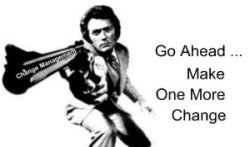|
What is change?Adapt to survive....why does it bother us so much...?
We are living through very challenging times, and it is more likely to get much worse in the months and years ahead before it gets better. We are facing tough times...
"Ch-changes… turn and face the strain..." Maybe it's to do with how we respond to the question: "What is change?"
And maybe that response is driven by how we perceive life?
Put simply, most of us see life from one of two perspectives: we either see life as fixed or we see it as fluid. This is significant because organisations are a reflection of personal attitudes. Or to put it bluntly, as a leader or manager, your organisation will reflect your attitudes.
This matters, this is not a mere philosophical abstraction, because it goes straight to the root of all resistance to, or acceptance of, change - why should I change - WIFM - "What's in it for me?".
If you have arrived on this page to discover more about personal change and how to cope in these challenging times then click on the graphic below which is linked to pages and resources on this site on how to manage personal change.
Organisational change is inseparable from personal changeKotter has said that the scale and pace of change that is impacting organisations now is such that it cannot often be planned for and it increasingly pushes leaders (and followers) beyond their own capacity to handle it. This scale and pace of change requires adaptive solutions. However, an adaptive response to change is only possible when we have either the personal capacity to do this, or have the personal development resources to help us. The inherent (and flawed) assumption in most training and work-related attempts at encouraging personal change (in support of organisational change) is that it is skills based, in other words we can be taught to change. Whilst it is true that we can be taught, generally we won't change. We can't change because of our "immunity to change" or inner resistance. Whilst this site if focused on the organisational aspects of change I can also provide you with the practical resources to show you how to change your life via my supporting site:
The hardwired default settingIf we regard life as fixed and static - we tend to think of it in terms of MY life, MY job, MY business, and all nicely packaged up with clear boundaries defining my own personal inner "map of reality" i.e. the process of cognition by which we record, categorise and interpret our life experience. In this perspective things are seen as separate and in stasis, time proceeds in a linear manner from past to future, and the human experience from this perspective is one of duality and separation. In other words, there is "me here" and the world "out there". So: "what is change?" is answered and illustrated by events like recessions - things that I don't like and that happen to me. This is how we as human beings are hardwired to behave - it's the "default setting" - and much of what we do is motivated by this inbuilt need to keep things as they are - to preserve the boundaries around "my life" - to preserve my survival and my safety and my comfort. "What is change, but something to be avoided - unless its on my terms and within my control." [WIFM?] Change as something to be avoided is also the default setting for most businesses - i.e. establish a business model that works and perpetuate it for as long as possible - with the same organisational motivations of survival, safety and comfort.
We shouldn't think of change as aberration any more
“Everything is in a process of change, nothing endures; we do not seek permanence.”[Masatoshi Naito]
Alternatively we can see life as fluid…. This is a perspective where things are perceived and experienced as inter-connected [even though the linkages may not always be apparent], constantly in movement and changing. This is a world of "dependent origination", change, movement and evolution. In this perspective life is regarded as a "process" and not a "thing" and the 'what is change' question is answered simply as: "change is life and life is change". Business and economic realities... But regardless of our philosophical interpretations of "how things are" the business and economic realities that we are currently living in is an environment of considerable change - and it is forcing us to experience considerable change in our businesses - and so the change question becomes "what is change management and how can we succeed with it?" Because we can anticipate it we ought to be ready for it In a recent interview, Edward Lawler [the author of over 350 articles and 43 books including his most recent, Achieving Strategic Excellence: An Assessment of Human Resource Organizations (2006) and Built to Change (2006)] said:
Survival of the most responsive
So the only current certainty is that there is no certainty. This really does mean change. Forced change. Reactive change. Planned change. And given the 70% failure rate of ALL business change management initiatives to deliver the promised benefits - getting it right is now business critical. Charles Darwin famously said that:
In a business context, organisational processes, behaviours and cultures evolved for a fixed and static environment have a very limited effectiveness in the fluid reality that we are currently experiencing.
Building a culture of change
Survival depends on continuous change So for an organisation to survive and prosper [or even just survive in the current climate] feedback processes and behaviours need to be aligned to the reality of the environment in which it operates or it dies. To quote Edward Lawler again: "Survival really depends upon continuous change in today’s economic environment... in most competitive business situations there’s no challenge to making the argument that boy if you aren’t changing and changing regularly you’re going to lose out because the market is moving that rapidly." But continuous change is hard work and deeply unpopular. People get change fatigue and resistant. Build a culture which supports change Do you recall the period after the last recession when Business Process Re-engineering was very popular.
But the focus was always on the process and not the people - and getting "buy-in" was once described by a change agent friend of mine as "like trying to get a bunch of turkeys voting in favour of Christmas"! After the last recession the focus was all about getting large businesses to function with the efficiencies of small businesses. In the present environment, it's all about getting people in large businesses to think, feel and respond like people in small businesses. Later in the same interview, Edward Lawler was asked what the secret was, for getting an organisation to embrace continuous change... "What all organisations can do is build a culture which supports change and likes change and that’s the most difficult thing to do in many respects ... how do you create a culture where people say, 'Oh good! We’re going to change?' rather than 'Oh no! Here it comes again, we’re going to get…' you know blah-blah-blah-blah-blah and all
too many organisations are in the latter condition." In my view, building a culture of change is extremely difficult unless an organisation has evolved to a stage where it deeply understands the question "what is change?" and what is involved in the practise and processes of leading and managing change. What's your view?
What is change management?
So what is change but a very present fact of life - and this website will give you the basic strategies for managing that change and in a manner that lays the foundations for building a culture that does support change. Having considered "what is change?", the next question to consider is: "What is change management?
Are we talking about incremental change or step change? It is very important to establish very early on whether or not what you are proposing can be regarded as incremental change and realistically can be accomplished within the constraints of "Business As Usual" - or not...
What is change management?
|


 What is change? Is it a fact of life to be welcomed - or something that occurs from time to time and disturbs our equanimity and is to be resisted?
What is change? Is it a fact of life to be welcomed - or something that occurs from time to time and disturbs our equanimity and is to be resisted?


